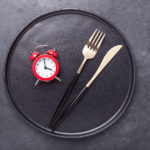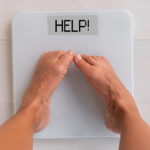By David Blyweiss, M.D., Advanced Natural Wellness
September 25, 2020
So, what’s the big deal with cereal? Why do people just assume it’s a good meal to start your day? I blame the marketing folks over in Battle Creek, Michigan – home of Kellogg’s.
They’ve made it “normal” to eat processed ultra refined carbohydrates and sugar to break our fast… especially if you’re a naïve child watching the commercials. Personally, I enjoy a different eating approach and it’s one I’ve learned by looking back at our ancestors.
I have an older age relative who swears by his morning cup of coffee. After sipping on his mug o’ joe, he’ll go without food for the rest of the day. Then, he’ll sit down to a nice, satisfying dinner each evening, even dessert, but that’s it until next nights’ dinner…and he’s the same weight as his senior year in high school.
Instead of coffee, I like to start my days with a hot mug of green organic tea. It allows me to hydrate and also delivers a dose of l-theanine for a healthy brain.
Then, I’ll eat lunch along with more fluids. In the evening, I’ll sit down to dinner and a gut-healthyglass of kombucha. After just six to eight hours of eating, I’m ready to relax for three hours (so my food can digest) before I head off to bed.
This Pattern of Eating Has Some Serious Health Benefits
You know what? I actually felt even better than I usually do, lost six pounds in about two weeks and didn’t feel like I was on one of those restricted dietary programs! I simply controlled when I ate. I’m writing this now on a sunday morning, green tea at the ready looking to my first meal of the day around noon. I had dinner 6:30 -7:00 last night…or about 17-18 hours between last bite of the night and first bite breaking the fast.
Open your arteries, improve blood flow for a new health miracle...
Did you know your circulatory system has over 60,000 miles of arteries, veins and other blood vessels, if stretched end to end?
But as you age, your blood vessels undergo changes, which may cause them to stiffen, thicken and get clogged.
GOOD NEWS! Doctors have now identified a “Miracle Molecule” inside your arteries that helps OPEN your arteries and IMPROVE blood flow.
It’s what Dr. Valentin Fuster calls it, "One of the most important discoveries in the history of cardiovascular medicine."To you, that means...
- Healthy blood pressure
- Sharper mind and memory
- Skyrocketing energy and muscular strength
- Increased pleasure and passion in the bedroom
- Improved circulation to every cell and organ in your body
Go here to discover a new natural way to significantly boost the levels of this miracle molecule in YOUR body NOW!
This pattern of eating – one with a smaller window of fewer meals – is a form of intermittent fasting called time-restricted eating.
A lot of folks start to get nervous as soon as they read the word “fasting.” But give me a second to explain…
If you look back at the history of how humans used to eat, you’ll find it’s not unnatural for us to go long stretches of time without eating. Our body was made to work that way. Even one or two full days without food wasn’t out of the question.
Look back even farther and you’ll see how our ancient ancestors commonly ate just one main meal. It’s only more recently in human history that we’ve started to stack on three, four, or even six grazing meals per day.
For many people, eating starts with a sugary breakfast in the morning. Then, they pack in a morning snack, a full lunch, an afternoon snack, and a calorie-rich dinner. Worse yet even more snacks in the evening mindlessly eating while watching TV.
This pattern of eating – along with unhealthy processed foods — has had some pretty serious health effects on our nation. The incidence of obesity in the United States has increased at an alarming rate in the last thirty years.
From 1999 through 2018, the obesity rates increased from 30.5% to 42.4% in the US. Severe obesity increased from 4.7% to 9.2% during that same time period.[1]
Obesity, as you know, is associated with much more serious problems. It’s strongly linked with cognitive decline during aging.[2]
To see a better way, I’d like to draw your attention to the small island of Okinawa on the southern end of Japan. One of the islands most famous exports was actually the actor Pat Morita – best known for playing Mr. Miyagi in the movie The Karate Kid.
The World's Quickest Solution for Ending Prostate and Urinary Misery
This has recently been revealed to be one of the only real breakthroughs in prostate health.
The seeds of a strange fruit (sometimes called "Chinese Apples") hold powerful phytonutrients that are a revolution in prostate health.
In fact, UCLA and Veterans Administration research have now proved this to be true.
Not only that, but it may be the worlds quickest solution for ending prostate misery.
Simply stated, these phytonutrients represent a huge step beyond beta sitosterol, saw palmetto, and other phytosterols alone.
Simply click HERE if you want to have fast prostate relief...restful, uninterrupted sleep...no more constant "urges to go"...enhanced virility...and optimal prostate support for life.
The island of Okinawa has a much higher population of centenarians – people who live past 100 years of age – than anywhere else in the world. They also have wonderful physical health and 60% lower rates of stroke and heart disease than other parts of the world.
Their secret? They eat about 20% less food during the day than other people in mainland Japan. [3] Let’s look at the specific ways time-restricted eating can help you age better.
It’s Not a Diet but It Can Change How Your Body Ages
First off, I want to be clear on my terminology. There are several different kinds of intermittent fasting. Some people feel best by eating one meal a day which they abbreviate as OMAD. This is what my older relative did with his morning coffee and dinner each day.
Other people prefer something called Alternate Day Fasting where they eat just 500-600 calories on Monday, Wednesday, and Friday. Then, on other days, they eat normally. Personally, I think this plan sounds like it’d be hard to manage,and just restricting you’re caloric intake only to starvation level intermittently? That sounds a lot like a recurring short term famine which your body can recognize too, with natural consequences like down regulating your thyroid gland activity… but I digress.
Instead, I prefer Time-Restricted Eating. When you follow this pattern of eating, you are eating only during a window of about six to eight hours per day. The rest of the time you are fasting and only drinking lots of fluids.
When you eat like this, you are flipping a metabolic switch in your body. Rather than burning glucose (sugar) for energy, your body is trained to instead rely on fat and something called ketones for energy. Ketones are created from the fatty acids in your body.
This helps your body use the fat you already have while preserving muscle mass and improving your overall body composition. It also helps your body perform better, age more slowly and prevents disease.[4]
Time restricted eating helps your brain stay healthy too. A study on mice showed intermittent fasting improves brain function and brain structure when compared to a high fat diet.[5]
Time restricted eating helps prevent a fatty liver, helps maintain a healthy gut, reduces heart aging, and helps your body better use stored fat on your body.[6]
The benefits don’t stop there. It also helps:
- Raise your human growth hormone levels.
- Drops insulin so your body’s fat stores are more available as a source of energy.
- Triggers a process called autophagy which cleans up old and damaged cells in your body.
- Helps trigger the longevity portion of your genes and turns “off” genes that shorten your lifespan.
All from eating healthy foods during a shorter period of time each and every day. If you decide to try time restricted eating, remember to drink plenty of fluids to help flush toxins out of your body.
For instance, you might have a hot beverage like tea or coffee in the morning. (I have two cups of different green teas, one decaffeinted before my first meal) Then, have an early lunch and wrap up your dinner by around 7pm. This leaves you about three hours to digest your food before you head to bed.
If you try this for a while, you can do a world of good for your body. Just remember not to take things too far. I don’t recommend combining time restricted eating with any sort of extreme diet such as keto.
So instead, look to eat non-processed foods with a variety of rainbow colors and concentrate mostly on natures’ gifts of toxin free food right from her earth.
Sources:
[1] Hales, Craig M., M.D., et al., Prevalence of Obesity and Severe Obesity Among Adults: United States, 2017–2018, NCHS Data Brief No. 360, February 2020, Available Online: https://www.cdc.gov/nchs/products/databriefs/db360.htm
[2] Bischof, Gérard N, and Denise C Park. “Obesity and Aging: Consequences for Cognition, Brain Structure, and Brain Function.” Psychosomatic medicine vol. 77,6 (2015): 697-709. doi:10.1097/PSY.0000000000000212, Available Online: https://pubmed.ncbi.nlm.nih.gov/26107577/
[3] Yasuo Kagawa, Impact of westernization on the nutrition of Japanese: Changes in physique, cancer, longevity and centenarians, Preventive Medicine, Volume 7, Issue 2, 1978, Pages 205-217, Available Online: http://www.sciencedirect.com/science/article/pii/0091743578902463
[4] Anton, Stephen D et al. “Flipping the Metabolic Switch: Understanding and Applying the Health Benefits of Fasting.” Obesity (Silver Spring, Md.) vol. 26,2 (2018): 254-268. doi:10.1002/oby.22065, Available Online: https://www.ncbi.nlm.nih.gov/pmc/articles/PMC5783752/
[5] Li, Liaoliao et al. “Chronic intermittent fasting improves cognitive functions and brain structures in mice.” PloS one vol. 8,6 e66069. 3 Jun. 2013, doi:10.1371/journal.pone.0066069, Available Online: https://www.ncbi.nlm.nih.gov/pmc/articles/PMC3670843/
[6] Chaix, Amandine et al. “Time-Restricted Eating to Prevent and Manage Chronic Metabolic Diseases.” Annual review of nutrition vol. 39 (2019): 291-315. doi:10.1146/annurev-nutr-082018-124320, Available Online: https://www.ncbi.nlm.nih.gov/pmc/articles/PMC6703924/







